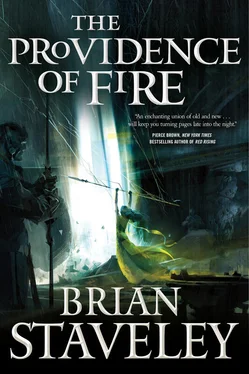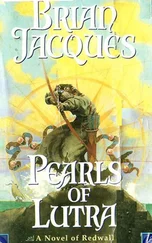Brian Staveley - The Providence of Fire
Здесь есть возможность читать онлайн «Brian Staveley - The Providence of Fire» весь текст электронной книги совершенно бесплатно (целиком полную версию без сокращений). В некоторых случаях можно слушать аудио, скачать через торрент в формате fb2 и присутствует краткое содержание. Год выпуска: 0101, ISBN: 0101, Издательство: Tom Doherty Associates, Жанр: Фэнтези, на английском языке. Описание произведения, (предисловие) а так же отзывы посетителей доступны на портале библиотеки ЛибКат.
- Название:The Providence of Fire
- Автор:
- Издательство:Tom Doherty Associates
- Жанр:
- Год:0101
- ISBN:9781466828445
- Рейтинг книги:4 / 5. Голосов: 1
-
Избранное:Добавить в избранное
- Отзывы:
-
Ваша оценка:
- 80
- 1
- 2
- 3
- 4
- 5
The Providence of Fire: краткое содержание, описание и аннотация
Предлагаем к чтению аннотацию, описание, краткое содержание или предисловие (зависит от того, что написал сам автор книги «The Providence of Fire»). Если вы не нашли необходимую информацию о книге — напишите в комментариях, мы постараемся отыскать её.
The Providence of Fire — читать онлайн бесплатно полную книгу (весь текст) целиком
Ниже представлен текст книги, разбитый по страницам. Система сохранения места последней прочитанной страницы, позволяет с удобством читать онлайн бесплатно книгу «The Providence of Fire», без необходимости каждый раз заново искать на чём Вы остановились. Поставьте закладку, и сможете в любой момент перейти на страницу, на которой закончили чтение.
Интервал:
Закладка:
“I’m not here to be generous,” Kaden said.
“Then perhaps you should not be here at all,” the man said. “The Malkeenians I knew understood the value of generosity. Of trust. Of mutual support.”
Kaden stared, dazed. “What Malkeenians?” He forced his heart to keep the same steady time, his lungs to rise and fall in deep, measured breaths.
“Your father, for one.”
Kaden shook his head. “Tan told me you would lie.”
Kiel raised an eyebrow. “As with all zealots, Rampuri Tan’s zeal distorts his vision of the world. I have given him no reason to distrust me.”
“I’ve seen the reason,” Kaden said. “I’ve been to Assare, to the orphanage where the bones are piled up like wood.”
“Ah, Assare,” Kiel said, blowing out a long, slow breath. “What a mistake that was.”
“A mistake ?” Kaden asked. “You murdered hundreds of children, an entire city of people, and it was a mistake?”
“I was not there,” Kiel replied, “but yes, I call it a mistake. How would you term it?”
Kaden searched for the word. “A massacre.” He shook his head. “An abomination.”
“Abomination,” Kiel said slowly, as though tasting the sounds. “It seems as though Scial Nin and his monks did not succeed with you. Not completely. Although,” he said, spreading his hands, “you passed the kenta to come here.”
Kaden nodded, realizing only as he did so that the statement was a trap, a trick. Kiel hadn’t known how he arrived until Kaden himself nodded. Irritation pricked at him like a bluethorn.
“You said you knew my father,” Kaden said, trying to return the conversation to safer ground.
The Csestriim nodded. “We were … not friends, but something analogous.”
“Prove it.”
Kiel considered him awhile. “That will be difficult. You’ve been with the Shin since you were a child.”
“I remember him well enough,” Kaden said, suddenly resentful of the idea that this inhuman creature claimed to know Sanlitun better than he had himself.
“All right then,” Kiel said. “Do you remember what he used to say about ruling his empire? The strongest leader is the one who does least. ”
Kaden had heard his father voice that idea or something similar dozens of times, but, after a moment, he shook his head. “All that shows is that you were in the Dawn Palace. Or that you knew someone who knew someone in the Dawn Palace.”
Kiel cocked his head to the side. “Fair enough. How about the formation that he kept on the ko board in his study whenever he wasn’t playing. The Fool’s Fortress.”
Kaden’s mind filled with the tiny cluster of stones.
“He kept it there,” Kiel went on, “to remind him of the weakness built into any perception of strength, to remind him that confidence sows the seeds of its own destruction.”
“I never heard him say that,” Kaden said.
“You never heard him say a lot of things,” Kiel replied. “You couldn’t have been more than ten when he sent you away.”
“It still doesn’t prove anything, doesn’t prove that he knew you, that he trusted you.”
For a long time the prisoner remained silent, staring out through the bars of the cage at a life Kaden could neither see nor comprehend. Finally, he focused on Kaden once more, a smile tugging the corners of his mouth.
“Your leg,” he said, “there is a small mark shaped like a crescent moon on the inside of your right thigh.”
Kaden resisted the urge to reach down and touch the small, dark spot.
“How do you know that?”
“I was there,” the prisoner replied. “At your birth. You burst from between your mother’s thighs with plenty of vigor, but for a long time you were silent-you didn’t cry, didn’t scream, just stared at the world around you with those burning eyes.” He shook his head at the memory. “The midwives were terrified that you were going to die, but your father calmed them. ‘This child understands the road he must travel. He is already practicing silence.’ And, in time, you began to cry in the way of all human children.”
Kaden stared, dumbfounded. He had never heard the story, not from his parents or his sister. Certainly not from the Shin. He had no way of knowing if it were true, but he did bear the crescent mark on his thigh. All his life it had been there.
“Why were you at the birth?”
“As historian,” Kiel replied. “It is what I do, what I am for. It is how I came to know your father in the first place.”
Kaden tried to make sense of the claim. All he had heard of the Csestriim involved war and slaughter, with a few vague references to their cities. “You were a historian?” he asked. “A Csestriim historian?”
Kiel nodded. “Your language is imprecise, but I believe you would say The Historian. I chronicled my people’s age-long war with the Nevariim, then the war with your kind. I was there for the reign of the Atmani-both the brilliant beginning and the tragic end. And I’ve been there for the centuries during which your own family has ruled.”
For a while Kaden just stared, then shook his head. “Still not good enough. There must have been half a dozen people at my birth.”
“There were eight,” Kiel said.
“Any one of them could have spread the story of the mark on my leg.”
The prisoner shook his head quietly. “At some point, Kaden, you must trust. It is this ability that the Ishien have lost. You must have realized already that they are nothing like the monks among whom you were raised. They found a different path to the blankness, one that has broken them. We showed them how, of course, inadvertently, when this was still a prison and we were still testing your people. We showed them how, but they perfected the technique.”
Kaden’s memory filled with Trant’s account, the tale of men gouging eyes, cutting off fingers, ripping out teeth, all in the awful cold and darkness, all to achieve their twisted version of the vaniate . This was the place to which he had dragged Triste. The horror of it settled on him like ice while a distant part of his mind, one untouched by either Kiel or the Ishien, continued to count, measuring out the heartbeats, cataloging them, keeping the dark passage of time.
“Your way out,” Kaden said. “Can we take Triste?”
Kiel hesitated, then nodded. “If you can break her free. And me.”
Kaden took a deep breath and ordered his thoughts while the Csestriim watched, silent, through the thin slot in the door.
“And how do I do that?” Kaden asked finally.
“The guard has the key. You start by killing him.”
20
The heavy cloud shoved up out of the south, blackening the sky over the lake, hazing the horizon. A few small, broad-beamed lake boats raced in front of it, heeled over, sails filled with the wind, canvas bright with the lingering light. Fishermen, probably, trying to get back to port before the rain. Trying and failing. One by one, the storm overtook them.
Adare watched it from the deck of the crumbling building, the remnants of a once-proud palace, the cellar of which housed Lehav’s war room. She stood in the full light of the sun, watching the storm come on like a wall, blackening the waves, stippling the dark waters. The morning sun shone on her face and shoulders, so warm she felt like she was looking at the painting of a storm, distant wind and fury a matter of clever brushstrokes and perspective. As she stared, though, it drew closer, closer, and then, in a moment, it was upon her, raindrops heavy as coins beating against her scalp, her shoulders, hammering the slate roof behind her. The air went limp and sodden. A wool blanket of muggy cloud blotted out the sun.
Читать дальшеИнтервал:
Закладка:
Похожие книги на «The Providence of Fire»
Представляем Вашему вниманию похожие книги на «The Providence of Fire» списком для выбора. Мы отобрали схожую по названию и смыслу литературу в надежде предоставить читателям больше вариантов отыскать новые, интересные, ещё непрочитанные произведения.
Обсуждение, отзывы о книге «The Providence of Fire» и просто собственные мнения читателей. Оставьте ваши комментарии, напишите, что Вы думаете о произведении, его смысле или главных героях. Укажите что конкретно понравилось, а что нет, и почему Вы так считаете.












